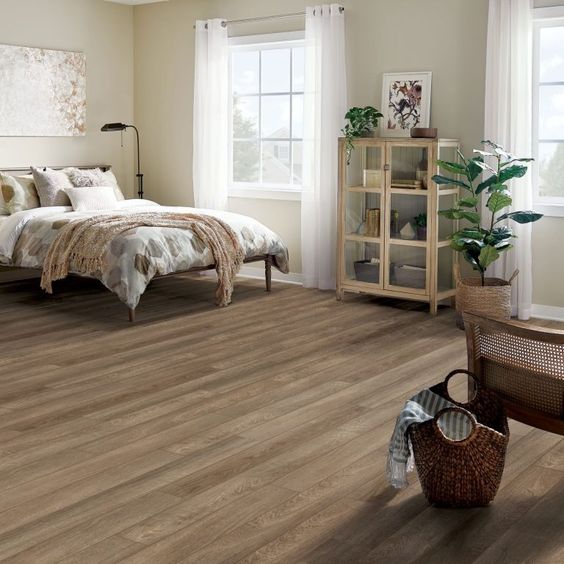Blogs
What is SPC flooring? Comparing SPC and WPC Flooring

Finding the best flooring option for your home can be overwhelming. With a multitude of opinions on what constitutes the ideal choice, it’s easy to feel lost amidst the options, many of which may seem quite similar. In this article, we provide a comprehensive overview of SPC vinyl flooring, while also comparing it to WPC vinyl.
What is Spc flooring?
SPC vinyl is a rigid-core luxury vinyl flooring option. The term SPC can refer to either stone plastic composite or stone polymer composite, indicating that the rigid core of SPC is crafted from a blend of stone and plasticizers, granting it exceptional durability.
SPC vs. WPC. Key Differences
The primary distinction between SPC (stone plastic composite) and WPC (wood plastic composite) vinyl floors lies in their rigid core composition. SPC’s core consists of 60% calcium carbonate (limestone), PVC (polyvinyl chloride), and plasticizers, while WPC is crafted from PVC, a smaller amount of calcium carbonate compared to SPC, plasticizers, a foaming agent, and wood-like materials.
In terms of appearance, style, and cost, these two products are nearly indistinguishable and offer a wide array of options. SPC tends to be slightly more durable due to its denser stone core, making it more resistant to scratches and dents, although both are waterproof. However, SPC is typically less cushioned underfoot compared to WPC, which may make it less comfortable for extended periods of standing.
Both types can be installed using the click-locking system and require minimal subfloor preparation, ensuring a straightforward installation process.
The Composition of Spc flooring
In most cases, a standard piece of SPC luxury vinyl flooring comprises four layers. The first layer, known as the backing layer, serves as the foundation, often featuring a pre-attached underlayment. The rigid core, typically the thickest layer, provides the vinyl with durability and strength while ensuring waterproofing to prevent rippling or swelling after installation. Atop the rigid core lies the printed vinyl layer containing a photo image that determines the floor’s style and design. Lastly, there is a wear layer that shields the floor from daily wear and tear.
Advantages and Disadvantages of SPC
One of the primary advantages of any vinyl floor is its waterproof nature, making it suitable for areas exposed to moisture throughout your home. SPC stands out as an excellent choice for homes with uneven subfloors, thanks to its rigid core design allowing installation over any existing hard surface. Minimal subfloor preparation and the interlocking system make it a straightforward installation for any homeowner. Its SPC core renders it the most durable flooring option available, offering easy maintenance and cleaning while still providing the ability to replicate natural materials.
However, despite these advantages, there are a few drawbacks compared to WPC, primarily due to its stone-containing core. SPC is harder than WPC due to its denser core and doesn’t retain heat as well, resulting in less comfort underfoot. Additionally, like all vinyl flooring, SPC lacks the authenticity of wood and is not fade-resistant when exposed to sunlight.
Installation and Maintenance Tips
When installing your SPC floor, there are a few important considerations to keep in mind. Firstly, allow your flooring sufficient time to acclimate to your home’s environment. Since the cores can expand and contract with temperature changes, it’s essential to place the flooring in the room where it will be installed for 24 hours to allow for this adjustment. While waiting, prepare the subfloor by ensuring it is clean, level, and dry.
During installation, it’s advisable to stagger each row to prevent seams from lining up exactly, resulting in a more refined appearance for your room. Once installed, maintaining your floor is simple and requires only routine sweeping or mopping to keep it clean.
Choosing Thickness and Style
When selecting the thickness of your SPC floor, it primarily depends on personal preferences. Generally, thicker vinyl tends to be more durable and provides added comfort when walking on it. Opting for a thicker vinyl is advisable if you have an imperfect subfloor, as it helps conceal these imperfections.
Additionally, pay attention to the thickness of the underlayment, as this contributes to the floor’s soundproofing capabilities. A thicker underlayment layer enhances soundproofing effectiveness.
Similarly, choosing the right style depends on the aesthetic you aim to achieve in each room. Fortunately, SPC vinyl flooring is available in a wide range of colors and styles, including those that closely resemble wood and stone flooring options.
Choosing Thickness and Style
Thanks to its water resistance, SPC vinyl flooring proves to be an excellent choice for any area of your home exposed to water, like kitchens and bathrooms. Its durability ensures it can withstand the daily wear and tear of these high-traffic areas. Additionally, it’s a great option for basements, which frequently encounter moisture issues. Its easy maintenance makes SPC an ideal flooring choice for secondary vacation homes as well.
Cost and Value of Spc flooring
One of the primary reasons homeowners opt for Spc flooring is its affordability. SPC offers long-lasting durability at a fraction of the cost of wood or stone floors, all while convincingly mimicking their appearance. Typically, professionally installed tile floors can range between $5 to $10 per square foot, whereas SPC costs only $1.50 to $2 per square foot. Moreover, the straightforward interlocking system enables many homeowners to save on installation expenses by completing the installation themselves.
RELATED NEWS
- How to Choose a Reliable SPC Flooring Factory 2025-10-13
- SPC Flooring vs Laminate Flooring 2025-07-30
- SPC vs LVT Flooring 2025-06-24
- What makes SPC Rigid Core Flooring is smart choice 2025-01-08
- Spc Vinyl Floor Samples feedback from USA customers 2024-11-13
CATEGORIES
LATEST NEWS
CONTACT US
Contact: Senoinfi Flooring
Phone: 8617763599241
E-mail: senoinfi@yeah.net
Add: Industry Park, Developmzne Zone,Liaocheng City,Shandong Province,China
